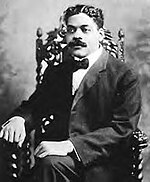Arturo Alfonso Schomburg
| Arturo Alfonso Schomburg | |
|---|---|

Arturo Alfonso Schomburg
|
|
| Born | January 24, 1874 Santurce, Puerto Rico |
| Died | June 8, 1938 (aged 64) Brooklyn, New York |
| Nationality | Puerto Rican |
| Movement | Harlem Renaissance |
| Spouse(s) | Elizabeth Morrow Taylor |
| Notes | |
|
Schomburg, also known as Arthur Schomburg, took an active role advocating Puerto Rico's independence.
|
|
Arturo Alfonso Schomburg, also Arthur Schomburg (January 24, 1874 – June 8, 1938), was a historian, writer, and activist. Schomburg was a Puerto Rican of African and German descent who moved to the United States and researched and raised awareness of the great contributions that Afro-Latin Americans and Afro-Americans have made to society. He was an important intellectual figure in the Harlem Renaissance. Over the years, he collected literature, art, slave narratives, and other materials of African history, which was purchased to become the basis of the Schomburg Center for Research in Black Culture, named in his honor, at the New York Public Library (NYPL) branch in Harlem.
Schomburg was born in the town of Santurce, Puerto Rico (now part of San Juan), to María Josefa, a freeborn black midwife from St. Croix, and Carlos Federico Schomburg, a German merchant living in Puerto Rico.
While Schomburg was in grade school, one of his teachers claimed that blacks had no history, heroes or accomplishments. Inspired to prove the teacher wrong, Schomburg determined that he would find and document the accomplishments of Africans on their own continent and in the diaspora. Schomburg was educated at San Juan's Instituto Popular, where he learned commercial printing. At St. Thomas College in the Danish-ruled Virgin Islands, he studied Negro Literature.
Schomburg immigrated to New York City on April 17, 1891, and settled in the Harlem section of Manhattan. He continued his studies to untangle the African thread of history in the fabric of the Americas. After experiencing racial discrimination in the US, he began calling himself "Afroborinqueño" which means "Afro-Puerto Rican". He became a member of the "Revolutionary Committee of Puerto Rico" and became an active advocate of Puerto Rico's and Cuba's independence from Spain.
...
Wikipedia
